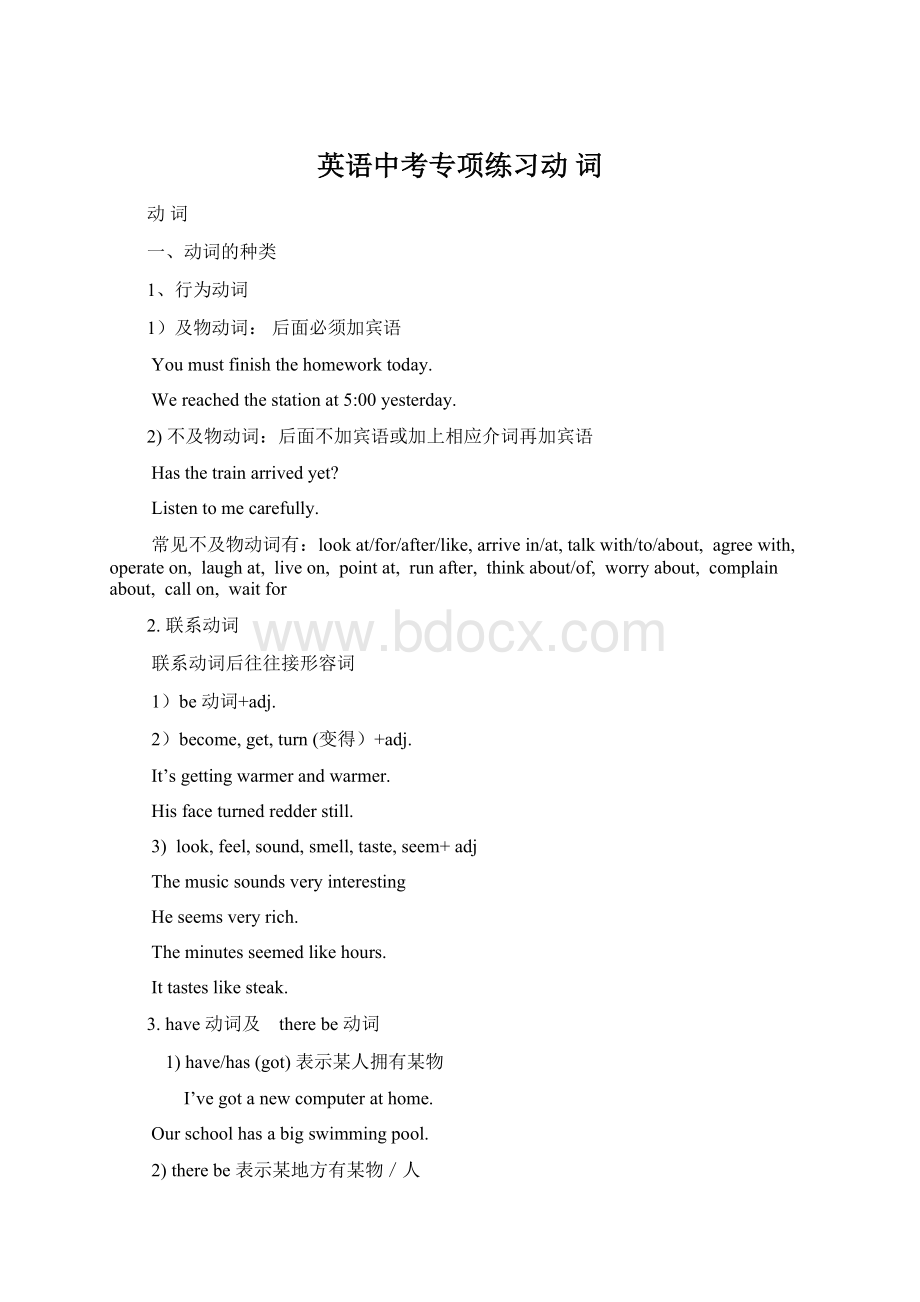 英语中考专项练习动 词.docx
英语中考专项练习动 词.docx
- 文档编号:7665804
- 上传时间:2023-01-25
- 格式:DOCX
- 页数:15
- 大小:25.49KB
英语中考专项练习动 词.docx
《英语中考专项练习动 词.docx》由会员分享,可在线阅读,更多相关《英语中考专项练习动 词.docx(15页珍藏版)》请在冰豆网上搜索。

英语中考专项练习动词
动词
一、动词的种类
1、行为动词
1)及物动词:
后面必须加宾语
Youmustfinishthehomeworktoday.
Wereachedthestationat5:
00yesterday.
2)不及物动词:
后面不加宾语或加上相应介词再加宾语
Hasthetrainarrivedyet?
Listentomecarefully.
常见不及物动词有:
lookat/for/after/like,arrivein/at,talkwith/to/about,agreewith,operateon,laughat,liveon,pointat,runafter,thinkabout/of,worryabout,complainabout,callon,waitfor
2.联系动词
联系动词后往往接形容词
1)be动词+adj.
2)become,get,turn(变得)+adj.
It’sgettingwarmerandwarmer.
Hisfaceturnedredderstill.
3)look,feel,sound,smell,taste,seem+adj
Themusicsoundsveryinteresting
Heseemsveryrich.
Theminutesseemedlikehours.
Ittasteslikesteak.
3.have动词及 therebe动词
1)have/has(got)表示某人拥有某物
I’vegotanewcomputerathome.
Ourschoolhasabigswimmingpool.
2)therebe表示某地方有某物/人
Thereisaswimmingpoolinourschool?
What’sonthedesk?
Thereisabookonthedesk.
Therearemanystudentsplayingfootballontheplayground.
Thereusedtobeacinemahere
4.情态动词can,may,must,need,should,及haveto,beableto,oughtto,usedto
1)can
Shecanspeakthreelanguages.(表示能力)
CanIuseyourbike?
(征求对方许可)
Hecan’tbeTom’sbrother.(表示猜测,不可能是)
2)may
MayIleavethetable?
(征求对方许可)
No,youmaynot./No,youmustn’t.
HemaybeTom’sbrother.(表示猜测,也许是)
3)must
MustIgetupearlytomorrow?
(表示有必要)
I’mafraidyoumust./No,youneedn’t.
Thelightison.Hemustbein.(表示猜测,一定是)
Youmustn’tplayfootballinthestreet.(不准,不该)
4)should应该 ,责任,义务
Everyoneshouldobeythesevendon’ts.(表示责任)
5)oughtto=should应该(语气稍重)
WeoughttohaveawordwithTom.
OughtwetohaveawordwithTom?
Yes,yououghtto./No,yououghtnotto.
6)need,haveto需要,不得不
MustIhanditinnow?
No,youneedn’t.
Youneedn’tfinishthehomeworktoday.不必
=Youdon’thavetofinishthehomeworktoday.
Ineedaboxofmatches.
Idon’tneedyourhelp.
7)usedto(过去常常做某事),hadbetter(最好做某事),wouldrather(宁愿做某事)
Iusedtogotoworkbybicycle,butnowIgotoworkonfoot.
It’slate,we’dbettergonow.
I’dratherdoitatonce.
5、助动词(无特殊意思,但能表示时态和语态,必须与动词原形或分词一起组成谓语)
be(am,is,are,was,were),do(does,did),have(has,had),will(would),shall
Don’topenthedoor.
Wendydoesn’tneedmuchsleep.
Didyoudoasurveyabouttheworkersinthefactory?
Wehaven’tmetforalongtime.
AlotofyoungteacherswillbesenttothewestofChina.
二、动词的时态
1、一般现在时
常用的时间状语有:
always,usually,often,sometimes,atnight,onceaday,inspring,twiceaweek,everyday(year,month,year),inthemorning,inMarch
1)表示客观真理和自然规律;
Thesunrisesintheeast.
2)表示现在的特征或状态.Helovessports.
3)经常性或习惯性的动作.Theygotoworkeveryday.
4)用于当主句是一般将来时或祈使句时if/unless条件状语从句中和when,assoonas,before,after,until,等时间状语从句中
I’llringyouupif/when/assoonasIgettheretomorrow.
2、现在进行时am,is,are+doing
常用的时间now,atthemoment,It’s8:
00o’clock.thesedays,theseyears,atpresent
1)表示此刻正在进行的动作 Iamspeaking.Youarelistening.
2)表示最近阶段主要的行为动作Theyarebuildinganewhighrisethesedays.
3)come,go,leave等构成的现在进行时表示将来I’mleavingforParistomorrow.
3、一般将来时
表示现在看来将要发生的动作或存在的状态,常与tomorrow,tomorrow(morning,afternoon,evening),thedayaftertomorrow,next(week,month…),thisevening,tonight,thiscoming(Sunday…),inthreedays,in2023,inthefuture,someday,soon,soonerorlater等连用.
Nancywillbeadoctorintwoyears.
Therewillbeasupermarketnearourneighbourhood.
Oliverwillhaveanicebikenextweek.
shall(第一人称)+动词原形
will(begoingto)+动词原形
4、一般过去时
常用的时间状语:
yesterday,yesterday(morning,evening…),thedaybeforeyesterday,(amoment,sixdays,long,long)ago,last(night,week,Friday,winter,year),once,oneday,theotherday,justnow,twodayslater,thatday,in1919,thosedays,thismorning
1)表示过去发生动作或情况、状态
Jennywasapolicemanmonthsago.
Therewasadirtyriverinfrontofthefactory.
Katehadanicecameraayearago.
2)usedtodo用来表示过去常常(而今不)
Iusedtogotoworkonfoot.(ButnowIgotoworkbycar.)
5、现在完成时have/has+过去分词
1)、表示对从过去一直延续到现在的动作或状态(从过去某一点至今的一段时间:
for10months,since1998,sincethen,sincetwoyearsago,thesedays,thisyear,inthepast/last20years,untilnow.
Samhasbeenanengineerfor30years/since1987
2)表示过去的行为对现在造成的直接影响
Therainhasalreadystopped.Let’sgoforawalk.(常和just,already,yet,ever,never 连用)
3)have/hasgonetosp.去了某地(人已不在)have/hasbeentosp.去过某地(人已回来)
A:
whereisTom?
B:
Hehasgonetothelibrary.
A:
Wherehaveyoubeen,Tom?
B:
I’vebeentothelibrary.
瞬间动词延续动词
joinbeamemberof/bein
diebedead
borrowkeep
buyhave
fallillbeill
catchacoldhaveacold
comeherebehere
comebackbeback
cometoChinabeinChina
leavebeaway
leaveherebeawayfromhere
gotobedsleep
endbeover
beginbeon
begintoworkwork
6、过去进行时
1)表示主语过去某个时刻或某个阶段正在发生的动作常与at8:
00yesterday,thistimeyesterday,atthattime,then,from6to8yesterdaymorning,thewholemorning,allday等时间状语连用
Wewerehavingamathslessonat8:
00yesterday.
Peterwasplayingvideogamesfrom6to12yesterdayevening.
2).在when,while连接的句子中也常用过去进行时。
WhenIwasdoingshoppingyesterday,Imetafriendofmine.
7、过去将来时
1)should+动词原形
•would+动词原形
•was/weregoingto+动词原形
2)站在过去立场说将来的判断,状态,行为动作等,多用于宾语从句中.
Nancysaidthatshewouldhaveanewjobsoon.
8、过去完成时had+过去分词
站在过去立场上说该立场之前的判断,状态,行为动作等,多用于
1)有by+过去时间的时间状语
Bytheendoflasttermwehadlearnedsixtenses.
2)When,before,after,assoonas,until,bythetime等连接词连接的复合句的主句或从句中
3)原因状语从句中
Kathydidn’tbuythedressbecauseshehadlostherhandbag.
4)宾语从句中
Wendysaidthatshehadreceivedfourlettersthatday.
5)表示追叙的简单句中
(1)Theboyswentouttoplay.Therainhadstopped.Thesunwasshiningbrightly.
(2)IsawKathylastweek.WehadnotseeneachothersincewepartedinParis.
9、答题要点
•找出时间状语,判断用什么时态。
如果试题是复合句或并列句或多句组成,则要考虑上下文决定;
•考虑用主动语态还是被动语态;
•考虑主语与谓语的人称与数的一致;
•知道祈使句,否定句,疑问句,带情态动词以及括号内有副词的时态填空如何答题;
•知道如何做时态填空.
1).表达客观规律、自然现象、风俗习惯和现在经常反复发生的动作。
这句话出现在宾语从句中,也不受主句时态的限制,一律用一般现在时。
2)宾语从句中的时态:
主句是现在时的,宾语从句就用现在时范畴的各种时态。
主句是过去时的,宾语从句则要用过去时范畴的各种时态。
3)带状语从句的复合句的时态填空:
主句将来时,条件if/unless、时间状语从句when,after,before,until/till,assoonas用一般现在时;
4)带有since引导的时间状语复合句中:
主句用现在完成时,时间状语从句用一般过去时.
中考演练
一、Choosethebestanswer(选择最恰当的答案)
()1.---MustIgetupearlytomorrow?
----No,you_____.TomorrowisSunday.
A.can’tB.mustn’tC.needn’tD.couldn’t
()2.--______Ihavesomechocolatesnow?
---No,you_____.It’stimeforbed.Youcanhavesometomorrow.
A.May,mustn’tB.Must,needn’tC.Must,mustn’tD.May,needn’t
()3.Afteralongwalk,theoldman_____betirednow.
A.canB.mustC.hastoD.need
()4.Computers________processdifficultproblemsveryquickly.
A.mustB.needC.shouldD.can
()5.Cars,busesandbikes_______stopwhenthetrafficlightschangetored.
A.canB.mustC.mayD.need
()6.We______keepthenewtrafficlawandlearnhowtoprotectourselves.
A.mayB.shouldC.canD.need
()7.Peoplearetoldthatthey______walkonthegrass.
A.mustn’tB.needn’tC.don’tneedD.maynotto
()8.IsawMissLiinShanghaiLibraryfiveminutesago.She_____beinYuGardennow.
A.mayB.mustC.mustn’tD.can’t
()9.John,you_____doyourhomeworktoday.Leaveitfortomorrow.
A.needn’ttoB.don’tneedC.don’tneedtoD.haven’tto
()10.Students____becarefulwhentheydochemicalexperimentsinthelab.
A.canB.mustC.needD.may
()11.Afteralongjourney,theeightpandasfromWolongsagely______inBeijing.
A.arrivedB.reachedC.gotD.came
()12.Look!
Jane’sgrandmother_______withsomeagedpeopleinthepark.
A.dancesB.dancedC.isdancingD.wasdancing
()13.Kevin_______toworkinhishometownafterhegraduatedfromuniversity.
A.goesB.wentC.willgoD.hadgone
()14.—MustIreturnthemagazinetoyourightnow,Sandy?
--No,you______.YoumaykeepituntilnextWednesday.
A.needn’tB.can’tC.mustD.may
二、Completethesentenceswiththegivenwordsintheirproperforms(时态填空)
1.Themoon_______(get)itslightfromthesun.
2.Weusually______(have)fourclassesinthemorningandtwointheafternoon.
3.Children______(like)watchingcartoon.
4.Students_______(have)tenminutes’restbetweenclasses.
5._______(notthrow)paperontheground.
6.“Tom,_________afraidofspeakinginpublic.Youarenolongerasmallboy,”saidMum.(notbe)
7.I’llgivethemessagetoherassoonasshe_______(return).
8.WewillgotoShanghaiZooifit_______(notrain)tomorrow.
9.Wewillhavenowatertodrinkoruseunlesswe______(stop)wastingitnow.
10.Whenspring_____(come),theanimalswhichsleepinwinterstartwakingup.
11.Tim’smotherworksinthatshoppingcenterandshealways______(do)herbesttoservethecustomers.
12.Itislateatnight.Dad______still______(work)atthedesk.
13.It’ssixo’clocknow.Jack_____(deliver)newspapers.
14.Don’tshout.Ourteachers______(have)animportantmeetinginthenextroom.
15.A:
Whereisyourmonitor?
B:
He______(make)amodelshipintheclassroom.
16.Charliecan’tgowithusbecausehe_____aprofessoraroundourcountry.(show)
17.It’sratherhottoday,buttheweatherreportsaysthetemperature_____(fall)to280Ctomorrow.
18.Whatsubject_____you______(study)nextterm?
19.I______(give)thislettertomyfatherwhenhe_______(come)backfromSingaporetomorrow.
20.We______(help)GrandmaLiwiththehouseworkthiscomingSaturday.
21.TaraisinterestedinChineseculture.She_____ChineseatFudanUniversitynextyear.(study)
22.TongTong______(show)hisunclearoundthenewneighborhood
- 配套讲稿:
如PPT文件的首页显示word图标,表示该PPT已包含配套word讲稿。双击word图标可打开word文档。
- 特殊限制:
部分文档作品中含有的国旗、国徽等图片,仅作为作品整体效果示例展示,禁止商用。设计者仅对作品中独创性部分享有著作权。
- 关 键 词:
- 英语中考专项练习动 英语 中考 专项 练习
 冰豆网所有资源均是用户自行上传分享,仅供网友学习交流,未经上传用户书面授权,请勿作他用。
冰豆网所有资源均是用户自行上传分享,仅供网友学习交流,未经上传用户书面授权,请勿作他用。


 铝散热器项目年度预算报告.docx
铝散热器项目年度预算报告.docx
